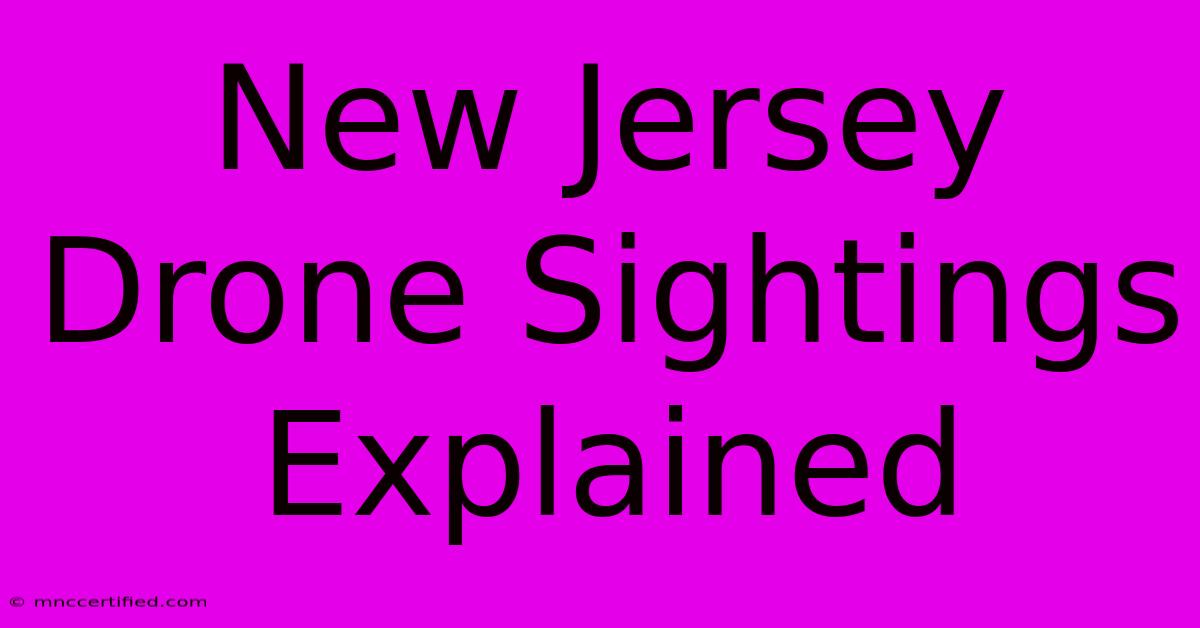New Jersey Drone Sightings Explained

Table of Contents
New Jersey Drone Sightings Explained: Unmanned Aerial Vehicles and Public Perception
New Jersey, with its diverse landscape and bustling population centers, has seen a rise in reported drone sightings. These sightings, often sparking curiosity and sometimes concern, warrant investigation and understanding. This article aims to demystify these occurrences, exploring the various reasons behind drone activity in the Garden State, addressing common anxieties, and outlining responsible drone usage.
Understanding the Rise of Drones in New Jersey
The increasing prevalence of drones in New Jersey is a reflection of broader national trends. Their affordability and accessibility have fueled their popularity across various sectors:
Commercial Applications:
- Real Estate Photography & Videography: Drones offer stunning aerial perspectives, significantly enhancing property listings. This is especially true in New Jersey, with its diverse housing styles and scenic landscapes.
- Construction & Infrastructure Inspection: Inspecting bridges, power lines, and other infrastructure is safer and more efficient using drones, reducing the need for costly and potentially dangerous manual inspections.
- Agriculture: Precision agriculture utilizing drones is gaining traction, allowing farmers to monitor crop health, identify problem areas, and optimize resource allocation. New Jersey's agricultural sector benefits from this technology.
- Public Safety & Emergency Response: Law enforcement and emergency services are increasingly utilizing drones for search and rescue operations, crime scene investigation, and traffic management.
Recreational Use:
- Aerial Photography & Videography: Hobbyists and enthusiasts utilize drones to capture breathtaking footage of New Jersey's coastline, mountains, and urban areas.
- Racing & Competitions: Drone racing is a growing hobby, with events and competitions occasionally taking place across the state.
Common Concerns & Misconceptions about NJ Drone Sightings
Many reported sightings stem from a lack of familiarity with drone technology. This can lead to understandable concerns, including:
- Privacy Concerns: The potential for drones to capture images or videos of private property is a valid concern. However, it's important to remember that laws regarding drone usage and privacy are in place (more on this below).
- Safety Concerns: Uncontrolled or reckless drone operation can pose safety risks. Collisions with aircraft or people are a possibility if proper safety protocols aren't followed.
- National Security Concerns: While less likely, sightings near sensitive locations can understandably raise concerns. However, most drone sightings are related to legitimate commercial or recreational activities.
Navigating the Legal Landscape of Drone Operation in New Jersey
Operating a drone in New Jersey requires adherence to both federal and state regulations. Key considerations include:
- Federal Aviation Administration (FAA) Regulations: The FAA mandates registration for drones weighing over 0.55 pounds and requires operators to pass a knowledge test for certain commercial operations. These regulations cover airspace limitations, operational guidelines, and safety protocols.
- New Jersey State Laws: New Jersey may have specific laws regarding drone usage in certain areas, such as near airports or sensitive infrastructure. It's crucial to research local ordinances before flying. Always check local and federal regulations before flying your drone.
Responsible Drone Usage in New Jersey
To mitigate concerns and ensure responsible drone operation, consider the following:
- Respect Privacy: Avoid flying over private property without permission.
- Fly Responsibly: Adhere to all FAA and state regulations. Maintain a safe distance from people and other aircraft.
- Be Aware of Your Surroundings: Pay attention to weather conditions, airspace restrictions, and potential hazards.
- Register Your Drone: Ensure your drone is properly registered with the FAA if required.
Conclusion: Understanding Leads to Acceptance
By understanding the various applications of drones and the regulations governing their use, we can better interpret drone sightings in New Jersey. While concerns regarding privacy and safety are valid, responsible drone operation and a clear understanding of the technology can alleviate anxieties and promote a safer, more informed approach to this evolving technology. Open dialogue and responsible practices are key to fostering a positive relationship between drones and the communities they operate within. Remember to always prioritize safety and respect the law.

Thank you for visiting our website wich cover about New Jersey Drone Sightings Explained. We hope the information provided has been useful to you. Feel free to contact us if you have any questions or need further assistance. See you next time and dont miss to bookmark.
Featured Posts
-
Hmrc Time To Pay For Self Assessment
Dec 12, 2024
-
Arsenal Predicted To Shut Out Monaco
Dec 12, 2024
-
Win Free Musical Tickets
Dec 12, 2024
-
Best Fits For Free Agent Burnes
Dec 12, 2024
-
Sex Education Actor Faces Sex Crime Charges
Dec 12, 2024